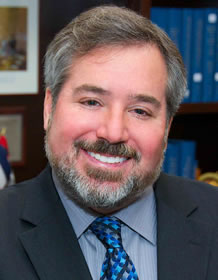 Combatting ISIS, coping with a complex China relationship and forming immigration policy have emerged as major issues among candidates in the 2016 presidential primaries.
Combatting ISIS, coping with a complex China relationship and forming immigration policy have emerged as major issues among candidates in the 2016 presidential primaries.
In the next Talking Foreign Policy broadcast, Case Western Reserve University Co-Dean Michael Scharf and a panel of international policy and law experts discuss and critique the Republican and Democratic candidates’ positions on these critically important matters of national security.
The broadcast airs Friday, Feb. 12, at 1 p.m. on WCPN 90.3 ideastream, and will be streamed at ideastream.org/programs/live. The program also will be available for subsequent review at the Talking Foreign Policy home page at law.case.edu/TalkingForeignPolicy.
Scharf created and hosts Talking Foreign Policy, a program produced by the university and WCPN ideastream, NPR’s Cleveland affiliate.
The discussion panel includes: Timothy Webster, assistant professor of law and director of Asian Legal Studies; Milena Sterio, law professor and associate dean at the Cleveland Marshall College; Cleveland attorney David Leopold, past president of the American Immigration Lawyers Association; and Navy Reserve Captain Gregory Noone, director of the National Security and Intelligence Program at Fairmont State University.
Webster, making his first appearance on the broadcast, has testified before Congress about China and is widely considered an expert on international trade, investment, human rights and dispute resolution.
“It’s a recurring dynamic in the United States when a candidate for president claims to be the one who will be tough on China, and what ends up happening is the person elected has to spend a couple of years smoothing out the relationship with China,” Webster said. “I think we’ll only see the rhetoric escalate over the next few months.”
The program’s panel touches on military and diplomatic strategies needed to defeat ISIS. Immigration issues facing presidential candidates involve the global crisis of Syrian refugees and the national debate about protecting the United States border with Mexico.

